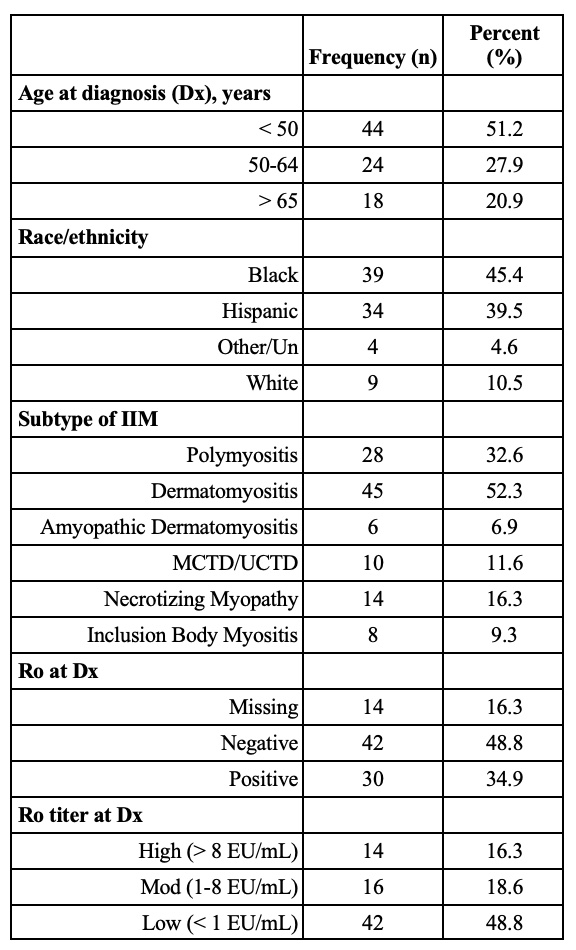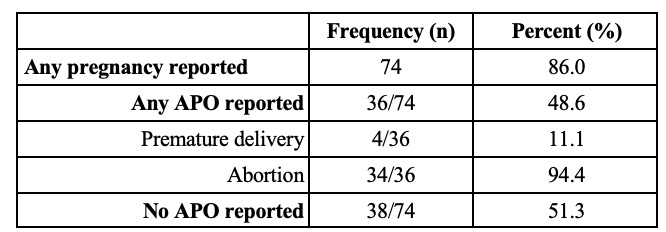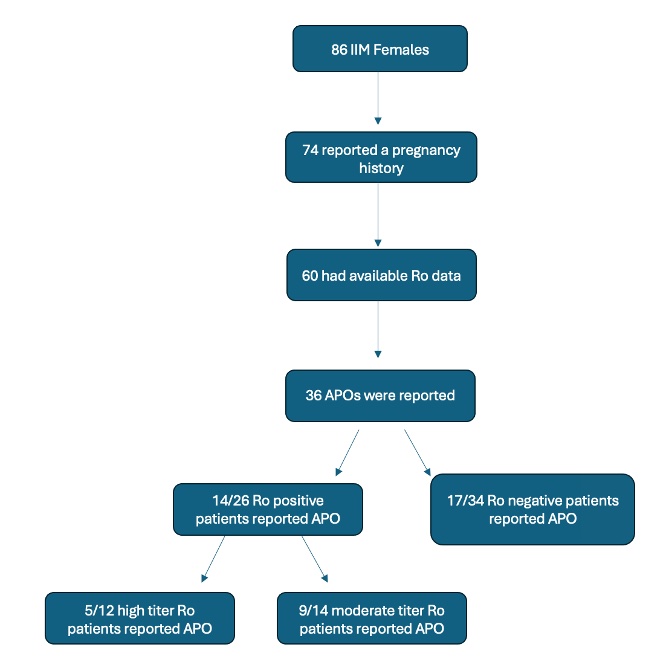Session Information
Date: Sunday, November 17, 2024
Title: Muscle Biology, Myositis & Myopathies – Basic & Clinical Science Poster II
Session Type: Poster Session B
Session Time: 10:30AM-12:30PM
Background/Purpose: Anti-Ro/SSA antibodies are associated with poor prognostic outcomes in patients with autoimmune disease. The presence of these antibodies can also cause adverse pregnancy outcomes (APOs) including preterm births and abortions in select conditions, such as systemic lupus erythematosus. We aimed to investigate the relationship of Ro positivity and titer with pregnancy outcomes in a diverse cohort of patients with idiopathic inflammatory myopathies (IIM).
Methods: Female patients from Montefiore Medical Center meeting 2017 EULAR/ACR classification criteria for IIM were included. Patient records were searched for demographic data, Ro positivity and titer, and pregnancy history including term births, preterm births, and abortions as documented by a medical professional. Ro-52 data could not be collected or evaluated due to low number of patients tested. We defined APOs as preterm births and abortions, including spontaneous, ectopic, and elective. Rates of APOs were compared among women with Ro positivity versus negativity; a sub-group analysis was done comparing APOs for high, intermediate, and low-titer Ro. High titer was defined as greater than 8 EU/mL, intermediate titer as 1-8 EU/mL, and low titer as below 1 EU/mL, similar to previous studies. Statistical analysis included descriptive statistics and Fischer’s exact test. P-values < 0.5 were considered statistically significant.
Results: Of the 86 women with IIM identified, 74 patients had a pregnancy history. Forty-four (51.2%) women were under 50 years of age at the time of IIM diagnosis, while 24 (27.9%) were ages 50-64 years and 18 (21.0 %) were over 65 years. Thirty-nine (45.4%) were Black, 34 (39.5%) were Hispanic, 9 (10.5%) were White, and 4 (4.6%) identified as Other, as seen in Table 1. Of the 74 patients with a pregnancy history, 60 had available Ro antibody data; 26 patients were Ro positive and 34 patients were Ro negative or low titer. Thirty-six patients reported adverse pregnancy outcomes; of these, 34 women (94.4%) reported an abortion, and 4 women (11.1%) reported a premature delivery, as seen in Table 2. Of these APOs, 54.0% (14/26) patients with Ro positivity reported an APO, while 50.0% (17/34) Ro negative patients reported an APO, yielding no significant difference (p = 0.77). Of the APOs seen in patients with positive Ro, 41.7% (5/12) occurred in high titer patients while 9/14 (64.3%) occurred in moderate titer patients (p = 0.84), as seen in Figure 1.
Conclusion: Although Ro antibodies are associated with adverse pregnancy outcomes in other autoimmune diseases, we could not confirm an association between Ro positivity and APOs in patients with IIM. This may be attributed to limitations such as retrospective evaluation, sample population, and lack of data regarding disease activity during pregnancy – thus warranting further investigation.
To cite this abstract in AMA style:
Weisleder H, Valle A, Rourke C, Mahmood S. Evaluation of Adverse Pregnancy Outcomes in Patients with Inflammatory Myopathies and Ro Positivity [abstract]. Arthritis Rheumatol. 2024; 76 (suppl 9). https://acrabstracts.org/abstract/evaluation-of-adverse-pregnancy-outcomes-in-patients-with-inflammatory-myopathies-and-ro-positivity/. Accessed .« Back to ACR Convergence 2024
ACR Meeting Abstracts - https://acrabstracts.org/abstract/evaluation-of-adverse-pregnancy-outcomes-in-patients-with-inflammatory-myopathies-and-ro-positivity/



